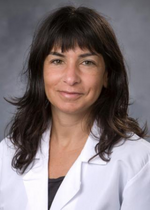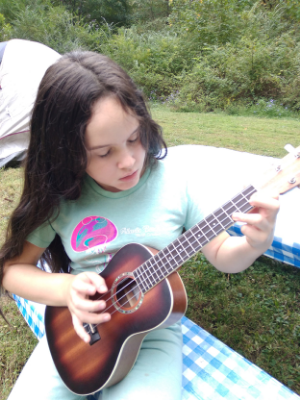
Although the term “eating disorders” is fairly common, it’s a bit misleading. That’s according to experts at Duke who say eating disorders are not about eating. Rather, individuals diagnosed with an eating disorder have a disrupted relationship with their bodies, which gets in the way of their ability to live fulfilling lives.
The Duke Center for Eating Disorders created an online community that aims to help repair that relationship by empowering children with eating disorders to listen to, decode, and respond to what their bodies are telling them—and ultimately develop a trusting relationship with their bodies.
Building Community
Developed with support from the Brody Brothers Foundation, the Duke Center for Eating Disorders web-based community offers children and their families free services, including weekly educational seminars, videos, and support groups.

Nancy Zucker, PhD, the center’s director, says the groups give the children and their families much-needed support, and having them available online makes them much more accessible. Families from all around the world have participated in the groups, including one from as far away as Botswana.
Some groups are focused on patients, while others are for parents. The parent support groups are different than most, Zucker says, in that the groups are structured, and many are led by therapists who offer the parents access to interventions.
“Having a community where parents trade tips and validate how challenging it is to be a parent of a child with an eating disorder is another way that we can be effective,” she says. “We thought an online community would increase access, make our interventions more effective, and give parents a greater level of support.”
The web-based community was created in 2018, which put it ahead of the curve when the COVID-19 pandemic began in 2020. Zucker says that during the pandemic, parents have had an increased need to find other parents who can relate to their experiences and experts who can provide guidance.
“The Brody family wanted these groups to be available to parents everywhere regardless of their financial resources,” Zucker says. “In that spirit, we’re building a community for parents anywhere.”
The web-based community also offers training for providers who care for children with eating disorders. They have trained 70 so far.
Developing Trust Through Helpful, Fun Interventions
Zucker, a professor in psychiatry and behavioral sciences and psychology, leads the Avoidant/Restrictive Food Intake Disorder (ARFID) parent education group. Children with ARFID have lost trust in their bodies and don’t eat enough to sustain healthy development, Zucker explains. They are vulnerable to chronic pain, anxiety, and depression and have an increased sensitivity to how their body feels.
“Because they’re so afraid of their bodies and try to ignore what their bodies are telling them, they don't learn some key developmental tasks,” Zucker says of children with ARFID. She develops interventions for both parents and children, teaching the children to become what she calls “feeling and body investigators—FBI Agents.” To date, Zucker has designed the FBI intervention for two clinical groups: young children with ARFID (FBI-ARFID Division) and children with recurrent abdominal pain (FBI-Pain Division).
“We try to teach them that their bodies are so smart and constantly getting smarter and telling them important messages that they can learn how to decode.”
In the interventions, Zucker uses cartoon characters with names such as Henry Heartbeat, Tommy the Thunderbolt, and Ernie the Energy Ball to illustrate these concepts and help the children better understand their bodies’ various sensations and decipher what they mean.
The children also do experiments that Zucker says are designed to give them perspective on just how smart their bodies are. For example, a simple running exercise offers a lesson on how the heart knows to beat faster during increased activity and to slow down as the intensity of the activity decreases.
“They have a body chart where they write down everything that they learned about their body,” Zucker says. “They’re developing a whole new mindset around themselves and their bodies: that they’re invincible, that they can do anything. Every aspect of that is unique. No one else is doing interventions like that with kids this age and with a body-centered approach.”
Zucker says Duke’s interventions are geared toward children as young as 5 years old, whereas at other centers the interventions typically start at age 8.
“We develop more child-directed interventions,” she says. “And we make interventions that are fun enough that the kids actually like them.”
Investigating Feelings and Solving Problems
In 2018, when she was 8 years old, Zoe Petko participated in a study led by Zucker that equipped her with skills similar to those taught in the ARFID group. Her mother, Betsy Petko, signed her up for a tummy pain study after Zoe began experiencing stomach pain so severe that it caused her to miss school and kept her from enjoying her favorite hobbies.

Zoe says the study’s interventions helped her distinguish between the various causes of her stomach pain—from anxiety to gas to hunger. “Before I was just like, ‘My stomach hurts,’” she says. “I had no idea what was happening or how to fix it. But afterwards, I more understood what's happening and what's a good way to solve it.”
Now 10, Zoe is still using the skills she learned in the study. She no longer misses school due to stomach pain and is back to playing ukulele, trumpet, guitar, and piano. She’s also working on two novels.
“Dr. Zucker's study made a huge difference,” Betsy says. “We went from missing lots of school and sitting on the sidelines during certain fun events to being able to actually do the things that Zoe likes to do. She kind of figured out a way to feel what she's feeling and then come up with how she wants to handle it.”
For more information on the Duke Center for Eating Disorders web-based community, visit the center's website. To learn how you can make an impact, please contact Director of Development Morgan Pope at morgan.pope@duke.edu or 919-385-3121.